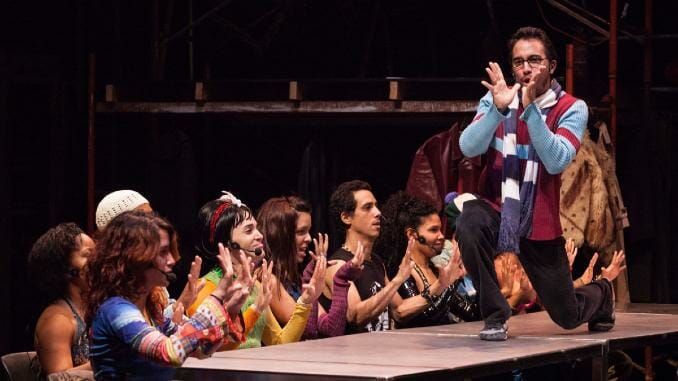Take or Leave Revolution Rent‘s Detailed But Shallow Documentation of Broadway’s Return to Cuba

Rent is the ‘90s. Every note of its riffs and every thread of its scarves resonate at the exact frequency of the decade. As catchy as some of its songs are, it hasn’t exactly been evergreen. So a facelift, even a minor, mostly extratextual one, is exciting. When ex-Broadway Angel Andy Señor Jr. brought the show to Cuba in 2014—the first American musical to come to the country in 50 years—that was just one facet of the venture. Released 25 years after the original Broadway premiere, HBO’s Revolution Rent is part behind-the-music production documentary, part video diary and part familial/political slice-of-life spanning both sides of the Cuban-American co-production. But in spite of, or perhaps due to, the plethora of aims in the film, directors Señor Jr. and Victor Patrick Alvarez struggle to answer the show’s opening query (“how do you document real life?”) satisfactorily.
Following Señor Jr. from Broadway to Miami to Havana, Revolution Rent gives enough backstory to situate those who’ve heard of the musical before immersing us in his family—first his mother and sisters, then his production team. These intimate interviews, which still feel a little stagey thanks to the directors’ planting and framing of questions compared to later interviews with the cast, include the film’s first gestures towards Cuban-U.S. relations. His parents fled to Miami after Fidel Castro’s revolution and his mother begs him not to return. Theater won’t change anything. Señor Jr. disagrees. Despite plenty of happy Cuban Renters, the film never convinces us either way.
If the documentary was blithely uninterested in unpacking the real impacts on Cuba’s entertainment industry and its artists, these slight gestures would seem almost irresponsible. Instead, its shallow attempts to blend insight with its feel-good “putting on a show” vibe reveal a regrettable mismatch of project and ability. Its directors may have filmed plenty of intriguing footage around the show’s production and some compelling natural narratives surely arose, but jamming its talking points together—the Cuban Thaw between Barack Obama and Raúl Castro which began mere days before opening night; Cuban exiles returning to their birthplaces—feels anything but natural. And so much is already present and understated when watching Rent rehearsals.
The charm of its cast and the winning novelty of hearing Rent’s undeniably earwormy tracks in a new language, with new underlying themes, magnetizes the rehearsals and its performers. The flashes of struggle—of production/costume designers attempting to build/clothe without resources; of broke rising Cuban stars in crappy apartments (all of whom share the same beat-up stovetop espresso maker, which I also have); of translation rewrites finding honesty in the right dialect of Spanish—revitalizes and recontextualizes the core tenets of Rent. What now feels false to East Village can feel real to Havana. But the documentary’s glances at these thematic links are so brief that their inclusion starts to feel spiteful: A peek over the fence at a better doc. We learn one star found out he was HIV-positive right before the show. Another chose the show over her marriage. One battles discomfort with the show’s queer physicality—a tough problem to have in Rent, but one ripe for culturally specific unpacking as labor camps and persistent homophobia haunt Cuba’s recent history. These details are tantalizing in the truest sense, as they’re never brought up again.
-

-

-

-

-

-

-

-

-

-

-

-

-

-

-

-

-

-

-

-

-

-

-

-

-

-

-

-

-

-

-

-

-

-

-

-

-

-

-

-








































